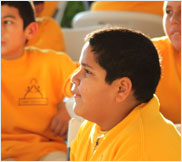Technology in Business
Students learn to use the computer program, Publisher, to produce important business documents and forms necessary for what they will need to go into business for themselves rather than hiring someone to do the job for them. If a student should hire someone to make their business forms, their knowledge of what it takes to produce documents will reflect their skill in selecting cost effective consultants or businesses to complete their work orders. In other words, they won’t allow themselves to get over-charged for jobs.
 Students will learn to create business cards/brochures and layouts etc., with graphics which cannot be done in Microsoft Word because graphics always requires a publisher program. They learn to visualize in their minds the type of professional document they want to produce as well as, the type of building in which they would like to house their business.
Students will learn to create business cards/brochures and layouts etc., with graphics which cannot be done in Microsoft Word because graphics always requires a publisher program. They learn to visualize in their minds the type of professional document they want to produce as well as, the type of building in which they would like to house their business.This class is taught by a seasoned art teacher/adjunct university professor of computer graphics who is also an entrepreneur. He brings a wealth of experience, know-how and sound techniques to teach children the most up-to-date fundamentals of computer graphics and computer skills with the added benefit of over 30 years of teaching experience. The class size is small (maximum 20 students) with a teaching assistant, enabling students to receive individualized attention, hands-on assistance and close monitoring of progress. Students learn in a safe and well disciplined learning environment. Another added benefit to the class is that it is high tech to keep students more competitive with their peers around the world; the class uses state-of-the art Smart Boards to teach the concepts and skills necessary for mastery and success. Students are required to think of a business, a business name and logo and spend the week stating that “I am an entrepreneur…. And the name of my business is…. It is a process call (PMA) Positive Mental Attitude.
Character Education/ Conflict Resolution
 This class is taught by a college graduate with a business degree and extols the hallmark of an entrepreneur. Students get the opportunity to brainstorm and use strategic thinking skills in discovering their own positive character traits that reflect an entrepreneur. Students are taught problem-solving skills, logic, responsibility, honesty and forth-rightness in resolving conflicts and making good choices. The class utilizes the Smart Board and role-playing techniques that have been taught in class. Students are given real life situations and are guided using proven techniques and respect for others to bring about acceptable resolutions. The small class size and the trust building exercises that are taught allows students to perform their tasks with optimum skills that encourage honesty and responsibility. Students get the opportunity to participate in cooperative learning teams and are encourage to express their feelings individually.
This class is taught by a college graduate with a business degree and extols the hallmark of an entrepreneur. Students get the opportunity to brainstorm and use strategic thinking skills in discovering their own positive character traits that reflect an entrepreneur. Students are taught problem-solving skills, logic, responsibility, honesty and forth-rightness in resolving conflicts and making good choices. The class utilizes the Smart Board and role-playing techniques that have been taught in class. Students are given real life situations and are guided using proven techniques and respect for others to bring about acceptable resolutions. The small class size and the trust building exercises that are taught allows students to perform their tasks with optimum skills that encourage honesty and responsibility. Students get the opportunity to participate in cooperative learning teams and are encourage to express their feelings individually.
The larger open classroom that is used allows for greater movement for team building and interactive learning styles.
Business Etiquette for Budding Entrepreneurs:
 Students are taught the nuances of the Social Graces to add just the right “finishing touches” to their education. The knowledge and skills learned help to prepare them for the “world of business ownership” with a greater sense of confidence and social savvy. Students participate in dining etiquette culminating in a daily dining practicum in the formal dining room of the AEH. They are challenged to use correct posture, fine motor skills and further develop eye-hand coordination skills in using the American and Continental dining styles of eating. They also learn the correct use of utensils and glassware in formal or informal settings. At the end of the week-long camp experience, students are able to negotiate a 3-course meal with the ease of a business professional. They have been observed as having that “extra” over the “ordinary” person making them “extraordinary” in their new found or improved dining and social skills.
Students are taught the nuances of the Social Graces to add just the right “finishing touches” to their education. The knowledge and skills learned help to prepare them for the “world of business ownership” with a greater sense of confidence and social savvy. Students participate in dining etiquette culminating in a daily dining practicum in the formal dining room of the AEH. They are challenged to use correct posture, fine motor skills and further develop eye-hand coordination skills in using the American and Continental dining styles of eating. They also learn the correct use of utensils and glassware in formal or informal settings. At the end of the week-long camp experience, students are able to negotiate a 3-course meal with the ease of a business professional. They have been observed as having that “extra” over the “ordinary” person making them “extraordinary” in their new found or improved dining and social skills.
Students learn how to shake hands with confidence and while employing appropriate body language for the business professional. Campers are taught the appropriate way to present a business card, the art of small talk at a closing reception which requires them to dress like business professionals. Students in this class are taught by a professional etiquette consultant with over 30 years of experience as an entrepreneur teaching hundreds of children, adults and business professionals the fine art of etiquette most notably, to graduating students at Harvard University. This instructor has advanced degrees with over four decades of teaching experience in the public school system and years of experience as an entrepreneur in the field of etiquette.
Communication Skills/ Public Presence
 Students are taught how to stand alone on a stage and present themselves before an audience. They are taught professional techniques, stage presence, voice projection, elocution and correct breathing techniques. Students are given immediate feedback and professional coaching by a professional theatre teacher from Morris Brown College. At the end of the week-long program, students are able to present themselves with confidence and the look of a savvy business professional on a stage and before an audience. Campers build leadership skills through confidence building and drama in this fun class. Students put on a closing program the last night of camp which includes a skit, poetry, gratitude speeches and key leadership roles as Mistress and Master of ceremonies for two deserving participants. Participants must announce their business on stage in the present: “I am an entrepreneur and the name of my business is…”
Students are taught how to stand alone on a stage and present themselves before an audience. They are taught professional techniques, stage presence, voice projection, elocution and correct breathing techniques. Students are given immediate feedback and professional coaching by a professional theatre teacher from Morris Brown College. At the end of the week-long program, students are able to present themselves with confidence and the look of a savvy business professional on a stage and before an audience. Campers build leadership skills through confidence building and drama in this fun class. Students put on a closing program the last night of camp which includes a skit, poetry, gratitude speeches and key leadership roles as Mistress and Master of ceremonies for two deserving participants. Participants must announce their business on stage in the present: “I am an entrepreneur and the name of my business is…”
Introduction to Screenplay & Screenwriting Principles
Course Overview: Students will learn the importance of story and how it develops from concept to final product. All students will learn writing techniques, but groups will be formed to work on the following projects: behind-the-scenes video, marketing flyer, Camp Exposure final recap video.
Lesson Breakdown:
- Importance of Story
- Brainstorming the Idea
- Writing with a Purpose
- Treatment, Script, Storyboard
- Developing Questions & Conducting the Interview
- Writing Promotional Copy
- Developing the Promotional Script
Introduction to the Principles of Photography
Course Overview: Students will learn the basics of Studio Production. Crew positions, terminology and camera techniques are covered.
Introduction to Mac OSX & Basic Computing
Course Overview: This class will focus on an introduction to the Mac operating system and developing new technology skills. Students will interface with tablets, the latest computer productivity software, editing software and production equipment.
Social Media & Marketing Principles
Course Overview: Introduction to social media for business and how to properly market a business using media and technology. Note: Students will not be creating social media accounts.
Introduction to Post Production: Audio & Visual Basics
Course Overview: Students are taught the basics of video editing and how to create the final video masterpiece.

